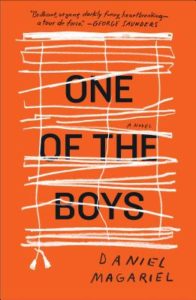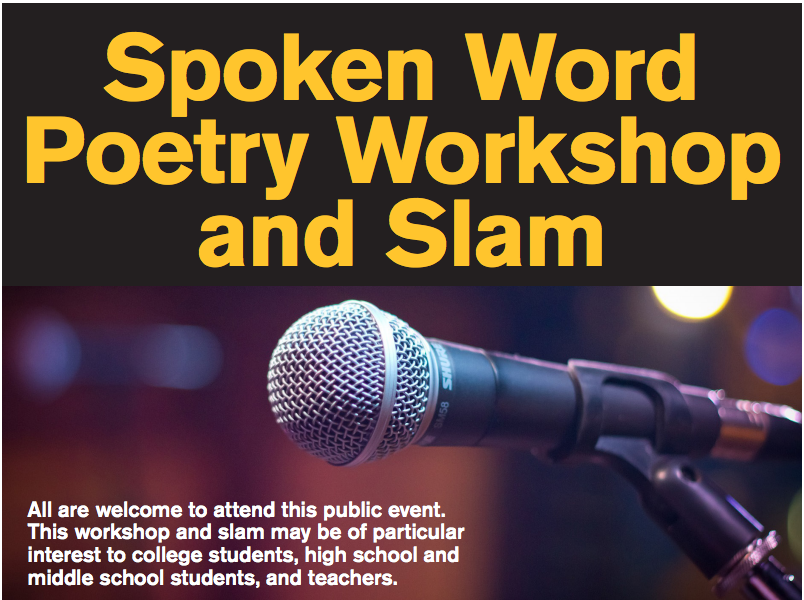 On Monday, August 28th, Changing Hands Bookstore in Phoenix will host Daniel Magariel for a workshop and conversation about his new novel One of the Boys. Purchase the book and you’ll get access to his workshop, “Editing with Abandon.” After the workshop, join the author for a presentation about the book. More information can be found here.
On Monday, August 28th, Changing Hands Bookstore in Phoenix will host Daniel Magariel for a workshop and conversation about his new novel One of the Boys. Purchase the book and you’ll get access to his workshop, “Editing with Abandon.” After the workshop, join the author for a presentation about the book. More information can be found here.
Workshop
#ArtLitPhx: Rachel Egboro “Telling the Whole Story”
 On Saturday, August 12th Rachel Egboro will be conducting a two-hour introductory storytelling workshop. Rachel is the co-founder of thestoryline.org, a Phoenix storytelling collective. During the workshop, Rachel will give some simple steps to begin and develop a story for an audience. The workshop costs $25 and will be at the Changing Hands Phoenix location. You can find more information and buy tickets here.
On Saturday, August 12th Rachel Egboro will be conducting a two-hour introductory storytelling workshop. Rachel is the co-founder of thestoryline.org, a Phoenix storytelling collective. During the workshop, Rachel will give some simple steps to begin and develop a story for an audience. The workshop costs $25 and will be at the Changing Hands Phoenix location. You can find more information and buy tickets here.
#ArtLitPhx: Gwendolyn Brooks Poetry Workshop at the Juneteenth Festival
 This Saturday June 17th is the annual Juneteenth Valley of the Sun Festival. The Juneteenth festival is a state holiday celebrating the end of slavery in the United States. This one day free festival will be held at Eastlake Park from 4-9PM and features guest speakers, art, music, dance, sporting events, and vendors.
This Saturday June 17th is the annual Juneteenth Valley of the Sun Festival. The Juneteenth festival is a state holiday celebrating the end of slavery in the United States. This one day free festival will be held at Eastlake Park from 4-9PM and features guest speakers, art, music, dance, sporting events, and vendors.
We Jazz June will host a Gwendolyn Brooks workshop at the event from 4-6PM. In addition to the writers’ workshop, the event will hold a discussion about Brooks’ poems, and an in-depth look at the Golden Shovel poetic form.
You can RSVP to the event on Facebook here. And more information about the Juneteenth Festival can be found here.
Guest Post, Vytautas Malesh: Face Your Critics, Face Your Fears, Face Yourself.
 Sooner or later, we all have to deal with critics. The old chestnut goes something along the lines of “but my mom says I’m brilliant,” and so we’ll have to forego any maternal input on our literary efforts in favor of words less warm, but probably more honest. Whether we’re talking about a submission editor’s hasty notes, a mentor’s line-by-line markup, or an Iowa-style “dead author” workshop session, the writer’s job in the face of criticism is to learn from that criticism. It’s a herculean task, but one which you the writer must master since, well, go back and read the first sentence.
Sooner or later, we all have to deal with critics. The old chestnut goes something along the lines of “but my mom says I’m brilliant,” and so we’ll have to forego any maternal input on our literary efforts in favor of words less warm, but probably more honest. Whether we’re talking about a submission editor’s hasty notes, a mentor’s line-by-line markup, or an Iowa-style “dead author” workshop session, the writer’s job in the face of criticism is to learn from that criticism. It’s a herculean task, but one which you the writer must master since, well, go back and read the first sentence.
While it is tempting to rest assured of your own brilliance, know that you dismiss any piece of criticism at your own peril. You’ll get the occasional ill-informed vagary along the lines of “I dunno, I just didn’t like it” or something else equally unhelpful. You’ll often find this sort of criticism in low-level undergraduate writing workshops around midterm and finals weeks, or following a weekend of epic tailgating. No need to really pay that too much attention if you are not so inclined.
But I digress.
Assuming that the critic has indeed read your work, considered it, and wants to offer constructive and helpful notes, it’s important to humble yourself and to listen. Criticism can sting, badly. That’s not quite doing it justice: criticism can make you want to curl up into a ball and never write again. But that’s what happens when you let your ego get in the way of your craft, and if you’re going to write – and, as a consequence, deal with critics – you must let go of your ego.
Some critics are relatively easy to endure – pedants checking your spelling and grammar, for example. Others are easy to dismiss if they are trying too hard to inject their own style matter into your work – the minimalist who insists you could chop your complex character drama down to about the length of a sonnet.
But other criticism cuts deeper. When you’ve had a gaping and irreconcilable plot hole revealed, or if someone should point out that your story so strongly echoes something else already in the world that no publisher would ever show it the light of day. Or that your characterization reveals you to be, or perhaps suggests that you are, sexist, or racist, or misogynistic, or homophobic, or otherwise holding a deep character flaw that perhaps you didn’t even know you had.
When faced with such criticism, it’s important to remember your service to the words – if you’ve been called out over questionable or even hurtful politics, take the time to think about what you’re doing and where you’re coming from. This is the sort of criticism that must not be ignored for both your own sake and, in a very real way, for the sake of the societies and cultures in which we find ourselves. If your work has struck a nerve and offended*, then observe the awesome power that words have in the world, and strive to use that power responsibly.
And of course, sometimes we just have to torch a piece. Perhaps the plot isn’t salvageable, or we realize we have plagiarized something we’ve never read (or at least that’s what our critics say). Cheer up – burn the failure and use the ashes like fertilizer to nourish the next piece. If the worst thing that happens after an encounter with hard criticism is more writing, then consider yourself lucky and get back to work.
*Disclaimer: “You shouldn’t be offended,” “I didn’t mean to offend anyone,” and “explain it to me – how is that offensive?” are not appropriate in this circumstance. If you have offended someone, you listen to what they have to say. Similarly, “I’m being offensive on purpose” is debatable at best, and you’re probably not being as witty as you think you are – people’s failure to “get it” is more likely your failure to deliver it.
Contributor Update: Ruben Quesada Brings His Talents To The UCLA Extension This Summer
Hey readers! Superstition Review is proud to announce that Ruben Quesada, a former faculty member at Eastern Illinois University who was featured in the Poetry section of Issue 13, has been named a faculty member at the UCLA Extension, and will be teaching a course on Poetry and Popular Culture alongside Rosebud Ben-Oni this summer. Do yourself a favor, and check out Ruben Quesada’s poem “On Witness” here, and stay tuned to the blog for more updates on the beautiful happenings here at Superstition Review.

#ArtLitPhx: Piper Writers Studio Spring 2017 Courses

The Virginia G. Piper Center for Creative Writing at ASU is proud to offer three creative writing classes through the Piper Writers Studio. Classes are taught by acclaimed and award-winning writers from the community, and cover topics such as fiction workshop, publishing, and character development.
The faculty for the Spring 2017 session of the Piper Writers Studio are:
- Marylee MacDonald
- Chantelle Aimée Osman
- Sharon Skinner
Classes are open to individuals of all backgrounds, skill levels, and experiences, and are designed to fit around the schedules of working adults (taking place weekday evenings or weekend afternoons). Classes will be held at the Piper Writers House, the historic President’s Cottage on the ASU Tempe Campus. Class sizes range between 8 and 12 students in order to ensure an intimate, individualized educational experience, and start at $75 (with discounts for individuals who are members of the Piper Circle of Friends). Classes can also qualify for professional development credit with the Arizona Department of Education. If you register before December 31, 2016, you can receive an additional discount of $50 off 4 week classes and $15 off single day classes.
For more information, please visit the Piper Center’s website.
#ArtLitPhx: Spoken Word Poetry Workshop and Slam
Spoken Word Poetry Workshop and Slam takes place on Saturday, November 5 from 5:30-8:30 p.m. at the Aravaipa Auditorium, ASU Polytechnic Campus.7211 Innovation Way, Mesa. The workshop features Tomas Stanton.
Stanton is a poet, educator, teaching artist, hip hop thespian and community organizer. He is co-founder of Phoenix-based Phonetic Spit, which uses the literary arts, youth development, and social justice programs “to empower young and emerging adults to find, develop, and publicly present their voices as agents of societal change.”
The event is organized by Wendy R. Williams, assistant professor of English education in ASU’s College of Integrative Sciences and Arts. The event is free and open to the public. Make sure to RVSP here.
Guest Post, Grant Clauser: The Curse of the Workshop
The Curse of the Workshop: Fighting the Inner Critic
If I count my first undergraduate creative writing workshops and go all the way to the present, where I run a monthly workshop group with friends, I’ve been poking and prodding at peers’ poetry for nearly 30 years. Some of that has been as an equal participant, and others as a teacher guiding newer poets in this or that direction. All that time sitting around a table trying to offer constructive observations has to do something to a person.
In fact, I know exactly what it’s done. It’s made it increasingly hard to read poetry, any poetry, without trying to fix it. I’m not sure, but I believe often that’s a problem, and it’s probably negatively affected my appreciation of poetry. I call it the curse of the workshop. I’ve heard another writer refer to this problem as something like the curse of knowing too much, and I have experience with this in my other line of work.
For the past 18 years my day job has been to write about electronics, and much of that writing is in the form of product reviews. Reviewing televisions had been a specialty of mine for several years, and I’d nitpick over details of the TV’s performance. I spent hours analyzing video test patterns, tweaking settings, looking for errant pixels. Once a fellow TV reviewer confided that he was no longer able to watch TV without watching what the TV was doing. This TV crushes whites. This TV’s processor adds too much edge enhancement. This TV blurs lateral motion.
 Audiophiles, and I know many of those eccentrics, who train themselves to appreciate the fine details produced by high-end speakers and $10,000 turntables, can’t enjoy a song on a car radio because they can’t separate the act of passively enjoying something from actively analyzing it.
Audiophiles, and I know many of those eccentrics, who train themselves to appreciate the fine details produced by high-end speakers and $10,000 turntables, can’t enjoy a song on a car radio because they can’t separate the act of passively enjoying something from actively analyzing it.
I fear the same problem can creep into poetry readers who have spent years practicing their workshop strategies. In a workshop, the goal, generally, is to help other people turn their poems into the best poems they can—sometimes it works; sometimes it doesn’t. There’s a built-in attitude that once a fresh poem has been passed around the table, it’s the participant’s job to try to fix it. We immediately launch into judgement mode, picking out distracting lines, unclear images, limp stanza breaks.
Of course, that’s what we’re supposed to do—it’s what all the people sitting around the table are there for, but it can also be counter-productive to enjoying the poem. In a workshop with friends recently, we were discussing a poem, and everyone, including myself, zero’d in on a couple of passages that stood out from the rest—the diction seemed a little incongruous to the subject, and so we did what seasoned workshoppers do, we started changing it. What we didn’t do was stop to appreciate what the writer was doing. After a few readings I allowed myself to release my grip on the workshop model, and instead read the poem for the poem.
And there’s the problem with workshop mode, with audiophile mode, with the curse of the expert mode—we read the poem through our current lens, bordered by our own definitions and rules, rather than read the poem on its own merits for the pleasure it produces.
A few weeks ago I was watching the Westminster Dog Show (or something similar—I really don’t remember) as each dog was pranced around the course. Judges, poked, stretched and measured the animals, comparing them to their memorized list of perfect attributes for that breed. These were beautiful dogs, well-groomed, well-trained, pampered, worth thousands of dollars, and yet never did anyone just reach out and hug the dogs. I wanted someone to love the droopy ears, the frantic wag, the smell of having just rolled in the yard. But the judges, the owners, the audience had drilled that appreciation out of themselves by knowing too much.
As a reader of poetry, I try to let myself become the dog lover, not the contest judge. I want to be the person driving around with the sunroof open and the radio blasting, not the audio critic taking notes. It’s this way that we get past the work and back into the poetry and remember what brought us to this wonder in the first place.
Guest Post, Cindy Clem: What Working at an Amish Market Has Taught Me About Writing
Last year, I quit teaching college students how to write and got a job at a new little grocery store beneath a wellness center in my town. I didn’t quit teaching FOR the market job, but it’s helping me cover bills until I do what I really want to do: TBD.
The market is Amish-owned and operated and sells a mixture of bulk foods, homemade canned goods, produce, deli meats and cheeses, and expired and/or damaged surplus goods (“bent-and-dent”). My education began immediately, when I was confronted by the first of a series of escalating grammatical dilemmas. Do I tell the boss that ‘glutin’ is spelled with an ‘e,’ forcing him to change the sign he bought for the front door? They say if you don’t speak up, you share the guilt. As an English major, is it my duty combat illiteracy? More importantly, what if customers think I don’t know how to spell? Luckily, the boss overheard a customer tell me that we’d (we’d!) misspelled gluten, so when he asked me, to my great relief, to correct it, I cut out an e-sized piece of white paper, drew a neat “e” on it, and taped it nearly seamlessly over the “i.”
But soon my boss decided to label almost everything with index cards, and the grammatical dilemmas rocketed. Banana’s, Carotts, Mazarela, Baking Supplys, Picinic Baskets, Yogart—even when “yogurt” is clearly printed on the Chobani container. They say if you don’t speak up, you get throat cancer. But I keep my silence. When tape wears out and the cards fall off, I write new ones, hoping to teach by example. But when my lovely “Bananas” sign falls, a new one appears: “Bananana’s,” that tiny fourth ‘a’ wedged in like a splinter into my heart.
Lesson one: Humility.
Who cares if customers, even those who know you used to work in the English department, think you don’t know how to spell? If you live with the embarrassment long enough, it ceases to bother you. As you become less critical of others (e.g., remember that Amish are bilingual, and you aren’t), you might become less critical of yourself (e.g., it’s okay that you’re not bilingual). You might even start to wonder if anyone cares about your mistakes as much as you imagine they do. (You might acknowledge that some people, perhaps English-major types, will care; they might even judge the quality of your thinking by the quality of your writing, but these types are few, and they are punished every day by their fear of being judged intellectually inferior.)
In other words, don’t be such a perfectionist. What’s the big deal? Carotts and mazarela can both be eaten at picinics. Write, and write more. Write imperfectly, even when you know better. Trust your readers’ capacity to overlook. Be kind to yourself.
Lesson two: Embrace other people’s contradictions. Other people’s contradictions = writing material.
 The market is Amish-owned and operated. I’m the only non-Amish (aka “English”) employee. Before the market, my impression of the Amish was of unsmiling faces pale between black hats and dark beards, staring straight ahead from the buggies we would pass in Lancaster County on the way to my grandma’s house. We saw Amish teenagers on scooters, one leg shoving the blacktop over miles of country roads; we saw little girls running in their yards wearing bonnets and aprons. We counted the Amish houses by the plain green shades pulled halfway down each window. No curtains, no pastels, no frills, no electricity—only cows, the Bible, and hard work.
The market is Amish-owned and operated. I’m the only non-Amish (aka “English”) employee. Before the market, my impression of the Amish was of unsmiling faces pale between black hats and dark beards, staring straight ahead from the buggies we would pass in Lancaster County on the way to my grandma’s house. We saw Amish teenagers on scooters, one leg shoving the blacktop over miles of country roads; we saw little girls running in their yards wearing bonnets and aprons. We counted the Amish houses by the plain green shades pulled halfway down each window. No curtains, no pastels, no frills, no electricity—only cows, the Bible, and hard work.
But seventeen-year-old Miriam has and uses a smart phone. She packs her lunch in a pink princess bag and wears Sketchers with her dress and hair net; her slim ankles and shapely, unshaven calves rise beguilingly above them. Thomas, with his long, white beard and homemade deli aprons, made a joke about bikinis one time and has often expressed his view that the mentally ill need medication, not just a better diet. He tells me stories about how traveling soldiers treated the Amish during the Civil War, stealing and ransacking; one man came into the store recently just to yell at Thomas for not fighting in Vietnam.
Caleb, the owner, has had massages and Reiki treatments from women at the wellness center upstairs, and he gets a ride every weekend to Lancaster to date Amish women. I’m not sure if it’s because he doesn’t like the ones here, two and half hours northwest, or if it’s part of the effort to mix up the gene pool. He posts regularly on the market’s Facebook page. He’s read A Course in Miracles, a book of Jesus’s teachings as channeled through Helen Schucman, a psychology professor at Columbia in the sixties. He shrugs off the channeling part: “It’s not any different than the prophets from the Bible.” He’s read the entire book, all 1000+ pages of it. He reads through the Bible every year, too; it’s just a little bit of reading each night, he says. And thus, lesson three.
Lesson Three: If you work steadily, stuff gets done.
You’d think I’d know this already. And I do, theoretically, although I’ve rebelled against slow, steady work my entire life. I have preferred the hare’s alternating energy blasts to the turtle’s plod, eternity made visible. But here, confronted with 50-lb bags of flour or pickling spice or oat bran that must be packed into 1 and 5 lb bags, I learn that I tend to WAY overestimate how long things will take, which means I rarely attempt anything that seems big—like writing a novel or trying to publish a book.
Packing monstrous amounts of basil into 4 oz containers, by the way, takes about an hour, not weeks and weeks of toil and cinders and little mice that sing and make clothes for you.
Lesson Four: Confidence is key.
Caleb knows nothing about food; Thomas says this is because he’s a bachelor whose mom cooks all of his meals. Thomas also says that Caleb doesn’t taste food—he just eats it. So in addition to having to explain to Caleb what a yam is (not a radish) and how long apples will stay fresh (not two years), we’ve had to explain that lumpy milk is bad milk and that hard chips are stale chips. “It tastes fine to me,” Caleb says, and sells it anyway. All of this is to say that it’s been Caleb’s life’s dream to own a grocery store, and now he owns one. He makes decisions quickly and in a minute reverses them without worry. He insists that customers will buy more if all prices end in a 9.
Lesson? You can do anything you want. Want to be a writer? Write! If Caleb wants to write a book one day, I have no doubt that he’ll do it promptly and with minimal worry about how it looks or sounds. That’s an editor’s job, anyway.
Lesson Five: Keep your deadlines flexible.
Under Caleb’s tutelage, I’ve learned the meaninglessness of the expiration date. If we haven’t sold something by 10/21/14, don’t worry! Just cross out the old date with a black marker and write in a new one, say 05/30/15. Or, play it safe and give everything we pack an expiration date of two years, whether it’s pretzels or fudge or cumin.
Some writers like deadlines. I don’t like deadlines, but I need them. For example, I was asked to write this blog in August and given a deadline of February. I like this. It gives me lots of time to set and cross out deadlines along the way. The deadline doesn’t matter that much as long as sometimes still buys the final product. The final product doesn’t have to be good, as long as someone buys it.
Lesson Six: Don’t worry so much about transitions.
One normally wouldn’t expect to find piles of mayonnaise on the produce table, but if you have boxes of expired mayonnaise and not very much produce, why not?
If one of your characters or ideas is not well-developed and you don’t know how to fix it, just write other stuff all around it. That will get people’s attention; they might even buy it.
If you notice that your list of lessons is less about lessons and more about some light sarcasm, don’t worry about accounting for this shift in tone.
Lesson Seven: Organization doesn’t matter.
People will find what they need. Cram your book/shelves with so many words/foods that people will be forced to dig through them to find the gold. It doesn’t have to make sense! It’s better if it doesn’t! People will discover something unexpected in the process.
For example, if you pack a sentence so full of words that they all jumble together like pineapple chunks soaked in heavy syrup and stuffed into a 15.5 oz dented can sitting on top of torn, stacked boxes of expired mackerel next to the pillar in the aisle off of which customers have to scrape the wooden molding to get by with their carts (and forget about handicapped access) and in the meantime you’re so tired of walking over to the deli to see if anyone needs meat and the webbing between your thumb and fingers is sore from triggering the pricing gun, then your sentence will force people to stay with it and look at it again and again, as many times as there are boxes of recalled diced tomatoes, and if anyone gives up and leaves, they’ll be dogged by the fear that they missed something really great. It’s kind of like reading the classics.
Lesson Eight: CINDY! DELI!
Sometimes you have to get someone to yell at you to hurry up even if you’re already on your way there.
Lesson Nine: It’s not rotten unless it makes someone throw up immediately.
If you must hang on to an idea (or potato salad) even though the essay (or customer) is just not buying it, do so.
Kill your babies, they say. But I say don’t kill them until you’re perfectly sure they are disgusting, ugly babies that make you want to throw up. Because sometimes those babies have to stick around for awhile until you stop being enamored with them. So, even though they may kill your entire essay or poem or book, let them have their way. Watch how they make your readers gag. Watch how they make your essay gag. Then, when you finally start to gag, even if it takes years, you can throw them out gladly and with relish.
Lesson Ten: Freely plagiarize yourself.
Just because you have expired matzos priced 2 for $1 in the first aisle doesn’t mean you can’t have another stack of the same expired matzos priced for .99 a little further down the aisle. Most customers/readers don’t look/read that carefully anyway. Go banana’s.
Lesson Eleven: Ignore your critics. In fact, it might be better for you to avoid workshop-style writing all together.
Trust your instincts. When you know that your efforts to keep the shelves orderly increase sales (for example, the same day you organized the salad dressing, almost every customer that day bought salad dressing), and you know that part of being orderly means not putting all 12 boxes worth of dented chicken noodle soup cans on the shelf at once, crowding out other soups, you can neatly place and label the extra chicken noodle soup in the storage area and safely ignore the co-worker who makes sarcastic comments like “People won’t buy it if it’s not on the shelves” and “You making another store back here?”
Even so, even when you know beyond doubt that you are completely and obviously RIGHT, the critics can still make you nervous. They can make you want to give up, to stop fighting the status quo and just stuff the shelves. In that case, you can either rally yourself or see lesson 7.
Lesson Twelve: Love your creations, whether they be characters, line breaks, lines of reasoning, descriptions, or plots. It’s all illusion anyway, so relish the process and forget the outcome.
Not all Amish stores operate this way (in fact, I’d bet most don’t). And even though I’m often stymied by grammatical or ethical dilemmas, I can still enjoy work if I loosen my desire to control and focus on what I like. I like using the cash register. I like cleaning fingerprints off the freezer glass. I like how Thomas sings when he mops the floor or cleans the slicer. I like getting lost in organizing the cake mixes, even when I come in the next day to find my entire system in disarray. It’s all about the moment anyway, right? I have yet to apply this attitude to writing, but I’m working on it.
Lesson Thirteen: When you’re ready to quit, don’t question yourself.
If you live in the flow, focus on process, stay in the moment, etc., you will know when it’s time to move on. The flow will divert, and you’ll float along with it. When that moment comes, don’t think about it, don’t open up the space for anxiety and second-guessing. Don’t worry about closure or timing or elegance. Just move on. This can apply to jobs or to essays.
Writing Circle with Mary Sojourner
Issue 3 contributor, Mary Sojourner, is hosting the Spring Jumpstart: A Writing Circle at the Changing Hands Bookstore on March 1st, 6:30-8:30PM.
The Jumpstart Writing Circle is “for those,” says Mary, “who have always wanted to write and haven’t, for blocked writers, and for writers who want to move to the next level of their work.” The Jump Start Circle is not designed to be a lecture, but rather an interactive opportunity for participants to write and develop their writing. Each Jump Start Circle varies. The cost is $25 and those interested can register at 480.730.0205.
